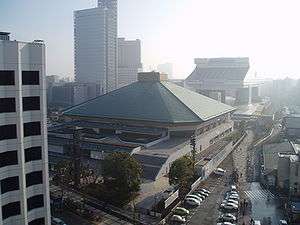Ryōgoku Kokugikan
 | |
| Location |
|
|---|---|
| Coordinates | 35°41′49″N 139°47′36″E / 35.69694°N 139.79333°E |
| Owner | Japan Sumo Association |
| Operator | Japan Sumo Association |
| Capacity | 13,000[1] |
| Opened | January, 1985 |
Ryōgoku Kokugikan (両国国技館 Ryōgoku Kokugikan), also known as Ryougoku Sumo Hall, is an indoor sporting arena located in the Yokoami neighborhood (bordering to the Ryōgoku neighborhood) of Sumida, one of the 23 wards of Tokyo in Japan, next to the Edo-Tokyo Museum. It is the third building built in Tokyo associated with the name kokugikan. The current building was opened in 1985 and has a capacity of 13,000 people. It is mainly used for sumo wrestling tournaments (honbasho) and hosts the Hatsu (new year) honbasho in January, the Natsu (summer) honbasho in May, and the Aki (autumn) honbasho in September. It also houses a museum about sumo.[2] The venue is also used for other indoor events, such as boxing, pro wrestling, and music concerts. In past years, it has hosted the finals of New Japan Pro Wrestling's annual G1 Climax tournament as well as the Invasion Attack and King of Pro-Wrestling events. On July 4, 2015, WWE hosted its The Beast in the East event in the arena.
History
The growing popularity of Sumo during the Meiji period led to the building of the original Kokugikan in Ryōgoku in 1909. The Japanese army appropriated the facility in World War II, and some tournaments were held outdoors at a baseball stadium. During the occupation of Japan, SCAP saw sumo as less threatening than other martial arts, and allowed a tournament there in November 1945. The occupation forces subsequently took over the area, however, and turned it partially into a skating rink. One more tournament was held in November 1946, but tournaments were thereafter held on the grounds of the Meiji Shrine until 1954. Tournaments were subsequently held in the Kuramae Kokugikan, which opened in 1954, until it was replaced by the current Ryōgoku Kokugikan in Yokoami in 1985.[3] It will host the boxing competition at the 2020 Summer Olympics.[4]
Gallery

Sumo wrestlers of the second-highest Juryō division prepare for a bout in the Ryōgoku Kokugikan. 


The suspended Shinto-style roof, or tsuriyane, over the dohyō. Above it are displayed the "man'in onrei" banners thanking the audience for a sold-out house.
In other media
In the anime series Hajime no Ippo, some of the characters participate in boxing matches in Ryōgoku Kokugikan.
In the manga series Prison School, some of the characters attend a student sumo tournament in Ryōgoku Kokugikan.
External links
| Wikimedia Commons has media related to Ryogoku Kokugikan. |
- 100 years of the Kokugikan
- Ryōgoku city core (the site of the 1st Ryogoku Kokugikan )
- Google Maps Street View inside the arena
35°41′49″N 139°47′36″E / 35.69694°N 139.79333°E
References
- ↑ http://www.worldofstadiums.com/asia/japan/ryogoku-kokugikan/
- ↑ Japan, An Illustrated Encyclopedia (Hardcover). Tokyo, Japan: Kodansha. 1993. p. 817. ISBN 4-06-205938-X.
- ↑ With God on Their Side: Sport in the Service of Religion (Hardcover). London and New York: Routeledge. 2002. pp. 151–2. ISBN 0-415-25960-6.
- ↑ "Venue Plan". Tokyo 2020 Bid Committee. Retrieved 11 September 2013.